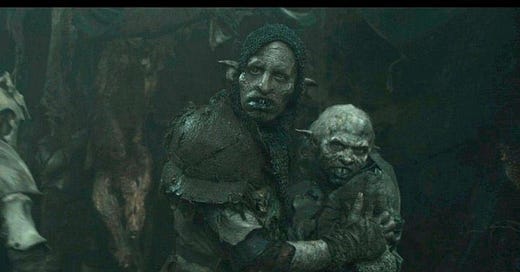Amazon’s ‘Rings of Power’ Season Two Spits in Tolkien’s Face
The creators of “Rings of Power” have committed cardinal sin by both tampering with the works of one of the English language's most cherished authors and by smearing Tolkien’s reputation
Forget Sauron. Middle Earth’s most dangerous threat might just be Jeff Bezos.
The new “Lord of the Rings” spin-off from Amazon, “Rings of Power,” recently debuted with its second season and it’s already a disaster.
Fans of Middle-earth were left jaws gaping during episode three when villain Adar enters an Orc village to entice them to fight against Sauron. Instead of the bloodthirsty brutes Tolkien wrote them as, these Orcs are oppressed lackeys trying to live in peace and harmony.
“We are safe here. We have a home. Must we go to war again?” a beleaguered Orc asks Adar. “You told me Sauron was dead. Let us leave him that way.” Upon agreeing to fight, the Orc approaches his wife and child who look at him with sadness as he prepares to leave for war.
Tolkien’s Orcs these ain’t.
In his wide body of work, Tolkien was clear that Orcs are made from evil and that evil is all they can ever be. In the Quenta, Tolkien originally wrote that mega villain Morgoth made the Orcs “of stone, but their hearts of hatred.”
Tolkien would later expand on that idea in multiple works, where he detailed how Morgoth either created the Orcs out of pure malice or corrupted the other races of Middle-earth as a mockery of the goodness inherent within them. Either way, Tolkien was clear that Orcs were not good and did not have the capacity for family or love.
But apparently the “Rings of Power” showrunners know better than one of the most influential authors in all of English literature!
In an interview with Deadline, showrunners Patrick McKay and JD Payne said their decision to humanize the Orcs against canon “goes straight back to Tolkien.”
“You read the books and you get these blips of moments where Orcs are kind of on their own and they’re saying, ‘Hey, what if one day there could be a place just for us, we could have our own little land or our own little cottage by the sea,’” Payne said. “They have dreams, they have aspirations, they don’t just want to be mindless killing machines.”
George R.R. Martin, the legendary author behind “A Song of Ice and Fire” and “Game of Thrones” and himself a Tolkien devotee, remarked on this tendency of narcissists.
“Everywhere you look, there are more screenwriters and producers eager to take great stories and “make them their own,” he wrote on his blog. “No matter how major a writer it is, no matter how great the book, there always seems to be someone on hand who thinks he can do better, eager to take the story and ‘improve’ on it.”
He added, “Nine hundred ninety-nine times out of a thousand, they make it worse.”
Tolkien also made this observation through the mouth of one of his protagonists. In “The Return of the King,” Frodo observes that “The Shadow that bred [the Orcs] can only mock, it cannot make: not real new things of its own. I don’t think it gave life to Orcs, it only ruined them and twisted them.”
So too has Amazon taken Tolkien’s work and twisted it.
But to what end? Likely a perversion and a misunderstanding of what the Orcs are meant to be.
Some on the left, unable to view the world except through a racialized lens, see Orcs as a fantasy allegory for black people. Thus, the Orcs needed a rebranding and could no longer be depicted as brutish monsters.
Tolkien never expressed this viewpoint, and was openly against the most heinous forms of racial inequality of his day. When Nazi publishers asked Tolkien if he was an Aryan when determining whether to release The Hobbit in Germany, Tolkien responded “I am to understand that you are enquiring whether I am of Jewish origin, I can only reply that I regret that I appear to have no ancestors of that gifted people.”
Then when his son Christopher noted the conditions of black South Africans during the World War II, Tolkien despaired that
As for what you say or hint of 'local' conditions: I knew of them. I don't think they have much changed (even for the worse). I used to hear them discussed by my mother; and have ever since taken a special interest in that part of the world.The treatment of colour nearly always horrifies anyone going out from Britain & not only in South Africa. Unfortunately not many retain that generous sentiment for long.
The creators of “Rings of Power” have committed cardinal sin by both tampering with the works of one of the English language's most cherished authors and by, intentionally or not, smearing Tolkien’s reputation.
Tolkien’s Middle-earth is an allegory for his native England, whom he loved so dearly that he wanted it to have a mythos all its own. Discontent with this apparently horrifying sentiment, Amazon decided to spit in his face with “Rings of Power.”
Yet still, there is hope.
As Gandalf tells what will become the Fellowship at The Council of Elrond, “Despair is only for those who see the end beyond all doubt. We do not.”
Fans have turned on “Rings of Power.” And if a lowly Hobbit can defeat the ultimate evil, so can we.




